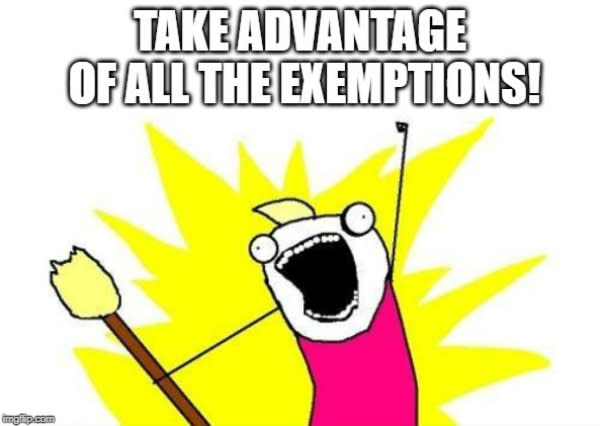Real Property Gains Tax (RPGT) In Malaysia, And Why It's So Important!

Klik sini untuk versi BM. 点击这里浏览中文版。
What Is Real Property Gains Tax (RPGT)?
In Malaysia, Real Property Gains Tax (RPGT) is one of the most important property-related taxes and is chargeable on the profit gained from selling a property.
Whether you’re a property investor or an owner just simply looking to sell your current home to purchase your dream home, it’s important to be aware of all costs associated with a real estate transaction.
It’s not always easy though! Our Government likes to keep things relevant and current.
RPGT rates in Malaysia were adjusted several times over the past few years, with the most recent changes announced as part of Budget 2022. There’s no time to stand still when it comes to RPGT in Malaysia it seems!
Don’t worry. We’ve got your back. Here’s a walkthrough of RPGT through the years, and what you need to know today.
RPGT Act Through The Years (1976 – 2022)
RPGT is a tax on profit. That means it is payable by the seller of a property when the resale price is higher than the purchase price.
The act was first introduced in 1976 under Real Property Gains Tax Act 1976 as a way for the government to limit property speculation and prevent a potential bubble.
[PropertyTip]Property speculation occurs when investors ‘speculate’ to earn huge profits by buying low, and selling high – making a large return on their investment[/PropertyTip]
Beyond this, RPGT Malaysia is a significant source of revenue for the government, with the earnings used for national development. As such, rates fluctuate depending on the economic needs of the country.
Although introduced in 1976, it took nearly two decades for RPGT Act to be implemented.
Since then, the RPGT Act has gone through several changes, with the government even suspending it temporarily between 2007 and 2009, then reintroducing it again in 2010.
In 2021, the Malaysian government announced an update to the RPGT Act in Budget 2022, which introduced a new change to RPGT by abolishing the 5% RPGT from the sixth year onwards for individuals who are Malaysian citizens and permanent residents.
Here’s a chart of the newly imposed RPGT rates effective 1st January 2022:
Who Pays RPGT?
Whether you’re a Malaysian citizen or foreign resident, RPGT applies to you as long as you’ve made a profit gain from selling your properties in Malaysia.
However, it’s important to note that the government provides a tax relief when there’s no profit made at all (selling price is equal to the original purchase price), or when a person suffers a loss from the property sold (selling price is lower than the original purchase price).
1) Malaysian Citizens & Permanent Residents
Malaysian citizens and/or permanent residents who sell their property within the first five years of acquiring it will be subject to RPGT.
0-3 years | 30% |
3-4 years | 20% |
4-5 years | 15% |
5+ years | 0% |
2) Foreigners & Non-Citizens
Foreigners will be charged a rate of 10% RPGT when they sell their property, five years or more after purchasing it.
Before that? Things get pricey! It’s 30% RPGT within the first five years.
0-5 years | 30% |
5+ years | 10% |
[article thumbnail=”https://cdn-cms.pgimgs.com/static/2019/06/NPA_1.jpg” title=”What You Need For A Property Purchase (Malaysians & Foreigners)” category=”Guide“]https://www.propertyguru.com.my/resources/sell-property-guide/complete-guide-rpgt-act-malaysia-12228[/article]
3) Companies
RPGT is also imposed on the disposal of shares in companies when 75% of its tangible assets involves real estate.
Here’s a look at the rates:
0-3 years | 30% |
3-4 years | 20% |
4-5 years | 15% |
5+ years | 10% |
What Are The RPGT Act Exemptions?
According to the RPGT Act, certain tax exemptions apply to profits on selling property:
| RM10,000 or 10% of the chargeable gain, whichever is greater. | Malaysian citizens and permanent residents. |
| 100% exemption on the chargeable gain. | Malaysian citizens and permanent residents. |
| 100% exemption on the chargeable gain. | Malaysian citizens only. |
What Is Allowable Loss?
You might also hear the term ‘allowable loss’ when it comes to RPGT. It’s important to understand what this is in relation to your potential tax bill.
Allowable loss can apply in circumstances where more than one property is sold by the same owner in the same tax year.
If you lose money on one sale by selling for lower than when you bought the property, you can then use that loss to offset any profit on another sale made.
So if you sell a property at RM20,000 loss, but then sell another at RM100,000 gain, your total taxable amount is RM80,000.
Good news, you made a profit though!
An allowable loss can be rolled over into coming tax years, meaning you can offset that poor sales performance against any profits you make on future property sales.
It’s not all bad news when it comes to tax!
What’s Allowable Expenses then?
It’s not just loss of profit from the sale that you can offset your tax bill, you’ll be delighted to know you’re also allowed some expenses.
Allowable expenses basically means the money you’ve spent improving or maintaining a property to retain/increase its value. That’s things like:
Enhancement: Money you’ve spent on refurbishments, extensions, improvements work, etc. can all be offset against your sales profit. So if you spend RM20,000 adding an extension onto your landed property, that payment can be used to offset the taxable profit of your sale by RM20,000.
Preservation: The same goes for preservation! Say your landed property is a heritage building for example, and you want to keep it looking good. You spend RM40,000 on specialist wood treatment to stop it from decaying, so that RM40,000 can be offset against the taxable profit from your sale.
One thing worth noting – the tax people really like to see receipts. If you can’t prove with clear evidence that you spent the money, they’re not going to let you offset it.
How To Calculate RPGT Malaysia?
Calculating RPGT is a fairly simple process. To know the taxable amount, first calculate your chargeable gain, which is the difference between the purchase price and the sale price.
RPGT would then be calculated by multiplying your chargeable gain with the relevant RPGT rate.
Let’s bring this to life with an example:
Miss A purchased a property for RM500,000 three and a half years ago, and sold it for RM800,000.
Miss A’s chargeable gain would be RM300,000.
Miss A’s RPGT = RM300,000 X RPGT Rate (which is determined by the number of years she’s owned the property, as well as her citizenship status within Malaysia).
In this case that’s a 20% RPGT rate, so the tax is RM60,000
Here’s that same example represented in table format. Keep in mind that this table is simplified and disregards some of the miscellaneous costs that get involved in the process.
A | Year of Disposal | 4 | 4 | 4 |
B | Property Purchase Price | RM500,000 | RM500,000 | RM500,000 |
C | Property Sale Price | RM800,000 | RM800,000 | RM800,000 |
D | Net Chargeable Gain | RM300,000 | RM300,000 | RM300,000 |
E | RPGT Rate (see infographic above) | 20% | 20% | 30% |
F | RPGT Payable | RM60,000 | RM60,000 | RM90,000 |
Property Sale Price – Property Purchase Price = Net Chargeable Gain
Net Chargeable Gain x RPGT Rate = RPGT Payable
Don’t forget that allowable expenses and allowable losses can offset some of the taxable gain from your sale! You don’t want to pay more than you have to.
How To Determine The Applicable Years?
As you can tell, when you sell your property is a huge factor which can see your final RPGT payable differ by tens of thousands of Ringgit.
In our example above, if Miss A had sold off her property a year earlier, her RPGT rate would be 30% instead of 20%. Meaning, she would have had to pay an extra RM30,000!
It can be rather confusing to determine the number of years you have owned the property (in a tax sense).
The number of applicable years (holding period) starts from the date of the property’s Sale and Purchase Agreement (SPA), and not the date of vacant possession.
It ends on the date of the property’s disposal or the date of the written agreement. Should there be no written agreement, the disposal date may be defined as the date of the final payment made.
Holding period aside, keep in mind that in Budget 2020, there was a change in base year from 1st January 2000 to 1st January 2013.
If you bought your house before this new base year, it reduces your chargeable gain by basing your property value on its value in 2013 instead. This value is determined by the Valuations and Property Services Department (JPPH).
When to pay for RPGT?
After disposal of your property, you are required to submit the RPGT return within 60 days of the disposal date.
Make sure you don’t take longer than 60 days to file your RPGT too! For late payments, the consequence is an additional 10% penalty on top of everything else!
How To File Your RPGT?
Most people typically file their RPGT through lawyers, but if you’d like to handle the process yourself, this is what you need to know:
Fill out the Disposal of Real Property (CKHT 1A) form, the Sale and Purchase Agreement (SPA) form, and other documents supporting the deductions you plan to make from RPGT.
If you plan to apply for exemptions under the RPGT Act, then make sure to fill out the Notification under Section 27 in the RPGTA 1976 (CKHT 3) form.
Don’t forget to have your buyer to fill out the Acquisition of Real Property (CKHT 4) form that comes along with a copy of the Sale and Purchase Agreement.
Finally, submit all forms and supporting documents to the nearest IRB (LHDN) branch within 60 days of the sale.
All forms are available at any IRB (LHDN) branch, or can be downloaded from IRB’s website.
After the submission of all documentation, the only thing left to do is to conduct the sale.
As part of the process, your lawyers will retain 3% of the selling price, which is sent to the IRB within 60 days of the sale. Any excess funds will automatically be refunded to you by the IRB.
Finally, ensure you don’t take longer than 60 days to file your RPGT or you are likely to end up with an additional 10% penalty on top of everything else!
Pros And Cons Of RPGT Changes
Nobody loves paying tax, but it is an important part of a functioning country. And we all like that at least!
So what are the pros and cons of the recent RPGT changes in Budget 2019, Budget 2020, and Budget 2022?
Budget 2019 RPGT Change – 5% tax after five years for Malaysians and Permanent Residents | |
|
|
Budget 2019 RPGT Change – 5% tax after five years for Malaysians and Permanent Residents | |
|
|
Budget 2019 RPGT Change – no RPGT on properties below RM200,000 sold after five years | |
|
|
Budget 2020 RPGT Change – change of base year to 1 January 2013 | |
|
|
Budget 2022 RPGT Change – Removed the 5% RPGT for properties held for more than five years by Malaysian citizens and permanent residents, effective 1st January 2022 | |
|
|
Relevant Guides:
51 Essential Property Jargon To Know For Buying A House In Malaysia
How To Calculate Your Affordability – Now vs Later
Memorandum Of Transfer (MOT) And 4 Important Documents In Malaysia
Disclaimer: Information provided on this website is general in nature and does not constitute legal advice.
PropertyGuru will endeavour to update the website as needed. However, information can change without notice and we do not guarantee the accuracy of information on the website, including information provided by third parties, at any particular time.
Whilst every effort has been made to ensure that the information provided is accurate, individuals must not rely on this information to make a legal decision. Before making any decision, we recommend you consult a legal professional to take into account your particular situation and individual needs.
PropertyGuru does not give any warranty as to the accuracy, reliability or completeness of information which is contained in this website. Except insofar as any liability under statute cannot be excluded, PropertyGuru, its employees do not accept any liability for any error or omission on this web site or for any resulting loss or damage suffered by the recipient or any other person.






